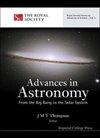QTT轨道焊接数值模拟与试验研究
IF 1.2
4区 物理与天体物理
Q3 ASTRONOMY & ASTROPHYSICS
引用次数: 0
摘要
考虑到世界上最大的全转向射电望远镜对指向精度高达2.5〃的苛刻要求,本文研究了天线方位轨迹的焊接实验。首先,针对QTT的方位轨迹,设计了反变形夹具和焊接工艺。然后,使用有限元模型对焊接过程进行了数值模拟。仿真结果表明,在原来的基础上适当减小反作用力,可以获得更好的焊接效果。轨道的三个变形过程由相对的变形夹具调节。结果表明,为QTT的方位轨迹设计的反变形夹具可以使变形量和平面度满足设计要求。最后,对轨道表面和轨道内部的焊接质量进行了无损检测。结果表明,方位轨迹焊缝无明显缺陷。为QTT设计的约束夹具和焊接工艺是有效可行的。本文章由计算机程序翻译,如有差异,请以英文原文为准。
Numerical Simulation and Test Study on Track Welding of QTT
Considering the stringent requirement of the pointing accuracy up to 2.5″ of the world’s largest full steerable radio telescope, this paper studies the welding experiment of the azimuth track of the antenna. First, the opposite deformation jig and welding process were designed for the QTT’s azimuth track. Then, the welding process was numerically simulated using a finite element model. The simulation results show that a better welding effect will be obtained by appropriately reducing the opposite force on the basis of the original. The three deformation processes of the track are regulated by the opposite deformation jig. The results show that the opposite deformation jig designed for QTT’s azimuth track can make the amount of deformation and flatness meet the design requirements. Finally, nondestructive testing was carried out to check the welding quality of the track surface and interior. The results show that there are no obvious defects in the welds of the azimuth track. The constraint jig and welding processes designed for QTT are effective and feasible.
求助全文
通过发布文献求助,成功后即可免费获取论文全文。
去求助
来源期刊

Advances in Astronomy
ASTRONOMY & ASTROPHYSICS-
CiteScore
2.70
自引率
7.10%
发文量
10
审稿时长
22 weeks
期刊介绍:
Advances in Astronomy publishes articles in all areas of astronomy, astrophysics, and cosmology. The journal accepts both observational and theoretical investigations into celestial objects and the wider universe, as well as the reports of new methods and instrumentation for their study.
 求助内容:
求助内容: 应助结果提醒方式:
应助结果提醒方式:


